Gone But Not Forgotten: Do You Remember These 12 Bygone Michigan Companies?
Would you like to save this full guide?
When people think of Michigan, some well-known companies come to mind, including Faygo, Gerber, Meijer, Kellogg, and Ford Motor Co.
As iconic as those companies are, there are many more that are a part of Michigan’s past. From massive department stores to grocers and restaurants to fun bookstores, and music shops, many Michigan companies evoke feelings of nostalgia for Michiganders of a certain age.
Companies that formed in Michigan from humble beginnings rose into nationwide brands with instantly recognizable logos. While they might not be in existence any longer, they haven’t faded yet from Michiganders’ memories.
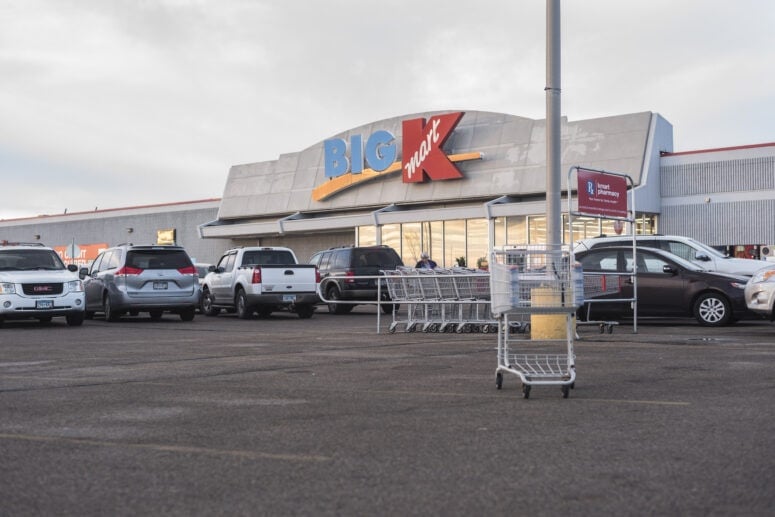
Kmart
Michiganders of a certain age remember the big red ‘K’ on the storefronts of Kmart stores throughout the state, including Super Kmart and Big Kmart centers.
The company that eventually became Kmart was founded in 1899 by S.S. Kresge and started as a five-and-dime store in Memphis in 1897. A second store was opened in Detroit in 1898. In 1916, Kresge incorporated a new company in Michigan; the forerunner of Kmart.
During its heyday, Kmart was a prominent racing sponsor in the CART series and NASCAR, sponsoring both cars and the Kmart 400 at Michigan International Speedway. It also gained a measure of fame in pop culture for its announcement “Attention, Kmart shoppers” during its Blue Light Special sales.
Increased competition and an inconsistent brand image were just two of the reasons for Kmart’s eventual decline and the company filed for bankruptcy in 2002. The company merged with Sears in the mid-2000s but saw a decline again by 2010.
The original Garden City Kmart closed in 2017 and the final Michigan Kmart in Marshall closed in 2021. Kmart has just two locations remaining in the continental United States; one in Miami and another in Bridgehampton, New York.

Borders
While some brick-and-mortar bookstores have struggled with the rise of online shopping and e-readers, for decades Borders Group (known locally as Borders Books) was a major player on the national book scene, especially in Michigan; a perfect spot to enjoy a hot beverage and some good reads.
The company was founded in Ann Arbor in 1971 by Louis and Tom Borders and once had more than 500 nationwide locations, including the first store in Ann Arbor.
Borders was acquired by Kmart in 1992 in an attempt to revive mall book chain Waldenbooks but was spun off in 1995 and formed into Borders Group. Borders also established locations in international locations like Singapore, New Zealand and. Australia
By 2007, Borders’ profits dropped drastically and the company filed for bankruptcy in 2011, announcing liquidation and the closing of 226 stores. Some of Borders’ assets, including the trademark, were acquired by Barnes and Noble, and international locations were acquired by other companies.
The Ann Arbor Borders closed its doors in 2011 as well.

Art Van
Founded in Eastpointe, Michigan in 1959 by Archie “Art” Van Elslander, Art Van was the spot to shop for furniture across the Midwest for decades.
What began as a small one-store operation in East Detroit, quickly grew to four stores by 1960 and even more by the 1970s, including in Flint and Lansing. At its peak, Art Van operated almost 200 stores in six states.
With offerings like a store credit card, clearance centers, and the PureSleep in-store sleep departments, Art Van continued to expand as recently as 2018.
In March 2020, Art Van filed for bankruptcy, but liquidation sales were cut short by the outbreak of the COVID-19 pandemic.
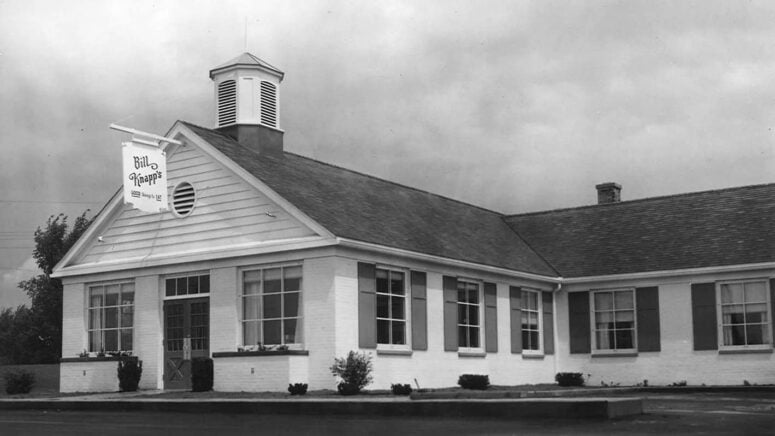
Bill Knapp’s
Long before the days of DoorDash at UberEats, Bill Knapp’s was among Michigan families’ favorite spots for a sit-down meal.
Founded by Clinton B. Knapp in Battle Creek in 1948, Bill Knapp’s had more than 60 locations at its peak, with most of them located in the Midwest.
Customers loved coming to Bill Knapp’s for its variety of delicious homestyle offerings, including fried chicken, soups, au gratin potatoes, and scrumptious chocolate cakes. The chain was known for its commitment to freshness and had a fleet of trucks to replenish food supplies every day.
The restaurant was also well-known for its anniversary and birthday discounts. Birthday discounts gave customers a percentage off their bill based on their age. Customers celebrating a birthday were given an entire chocolate cake to take home.
Changes in demographics and restaurant operations eventually led to bankruptcy and the last restaurant closed in 2022. Baked goods with Bill Knapp’s name can still be found in Michigan grocery stores, giving Michiganders a chance to enjoy a small piece of nostalgia.

Farmer Jack
While Kroger and Meijer are popular grocery stores in Michigan, metro Detroiters surely remember getting their fruits, vegetables, and other items at Farmer Jack.
Known for its slogan, “It’s always savings time at Farmer Jack!” this grocery chain had 100 locations at its peak and had its company headquarters in Detroit.
The company was founded in 1924 in Detroit when Jewish-Russian immigrants opened a grocery store at 12th and Forest in Detroit. A merger with another grocer and the acquisition of more stores led to the creation of the Farmer Jack moniker in the 1960s.
In the 1990s, A&P paid more than $70 million for dozens of Farmer Jack stores and converted existing A&P locations into Farmer Jack stores, making the chain a major player in Southeast Michigan.
By the early 2000s, the chain began losing money in part due to failed expansion, a delayed response to grocery price wars of the time, and a lack of capital improvements to its stores. The company went through liquidation and was defunct by 2007
Perry Drug Stores
Founded by Jack A. Robinson in Pontiac in 1957, Perry Drug Stores was a mainstay in Michigan before bigger chains like CVS, Walgreens, and Rite Aid were commonplace.
At its peak, Perry Drug Stores operated more than 200 locations, most of them in Michigan. By the 1990s, the chain was the most prominent drugstore chain in the Detroit area and also expanded into Michigan’s Upper Peninsula.
In addition to being the go-to pharmacy for many Michiganders, Perry also operated two specialty chains: Auto Works, which specialized in auto parts, and A.L. Price, which specialized in discount health and beauty aids.
By 1995, Rite Aid acquired all of Perry’s 200+ locations, marking the company’s largest acquisition and bringing Rite Aid to the Detroit area for the very first time.
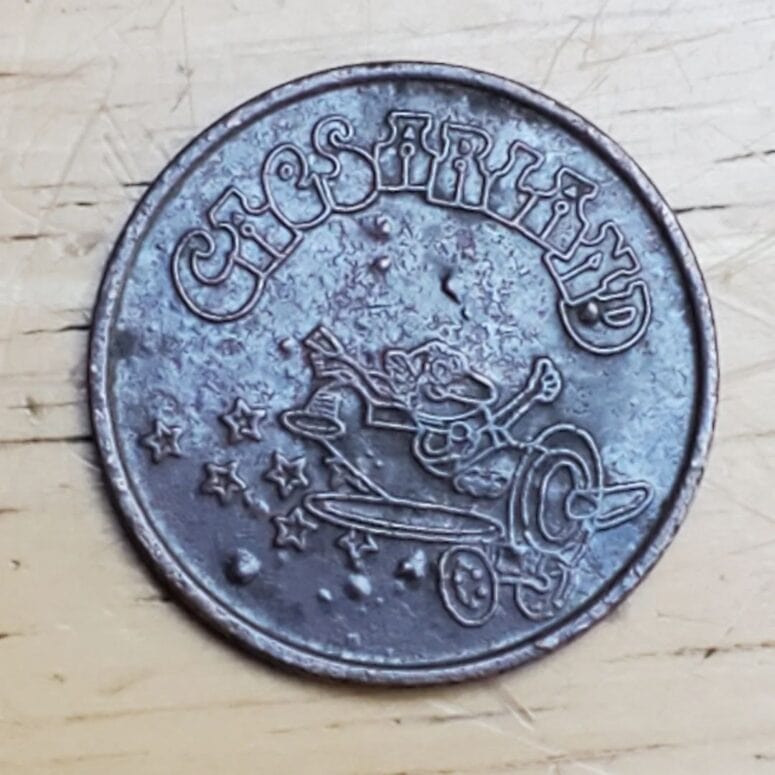

Caesarland
While scores of youngsters have long enjoyed the combination of pizza and games at Chuck E. Cheese, Michiganders in the 1990s remember Caesarland as the place to go for kids’ entertainment.
Caesarland was pizza giant Little Caesars’ take on Chuck E. Cheese, a wonderland filled with pizza, games, and fun; a popular spot for birthday parties and other fun activities.
While Little Caesars is still alive and well in Michigan, with more than 300 locations, Caesarland ceased operations years ago. Today, people looking for a drop of nostalgia can purchase Caesarland arcade tokens on eBay.
Hamady
While Hamady operated a little more than three dozen stores at its peak, this Flint-area grocer was well-known. Due to the number of locations in the area, the store’s grocery bags were often called Hamady sacks.
The first store was opened in 1911 by cousins Michael and Kamol Hamady on East Dayton Street and Industrial Avenue. In 1980, the chain expanded in Michigan, turning former Kroger locations into Hamady stores, mostly in West Michigan.
A strike in the late 1980s hurt operations and the company declared bankruptcy in 1988. Hamady’s assets were eventually sold and the last location closed in 1991.
A Hamady Complete Food Center opened briefly in August 2017 in Flint but closed after just three months.

Harmony House
Long before the days of MP3s, MP4s, and music streaming sites, Michiganders flocked to Harmony House locations to get the latest and greatest in records, cassettes, 8-track tapes, and CDs.
The company was founded in Hazel Park in 1947 and at its peak, it operated just 38 stores, including 36 in Michigan. It became the go-to spot for the latest releases by the biggest acts in music and the chain was also known for its support of independent music.
Additionally, each Harmony House location had a Ticketmaster outlet, giving music enthusiasts a place to go for tickets when concerts were announced.
The increased sales of music by bigger chain stores contributed to the company’s eventual closing in the early 2000s. The last store was sold in 2004 and rebranded as an FYE store before it closed in 2019.
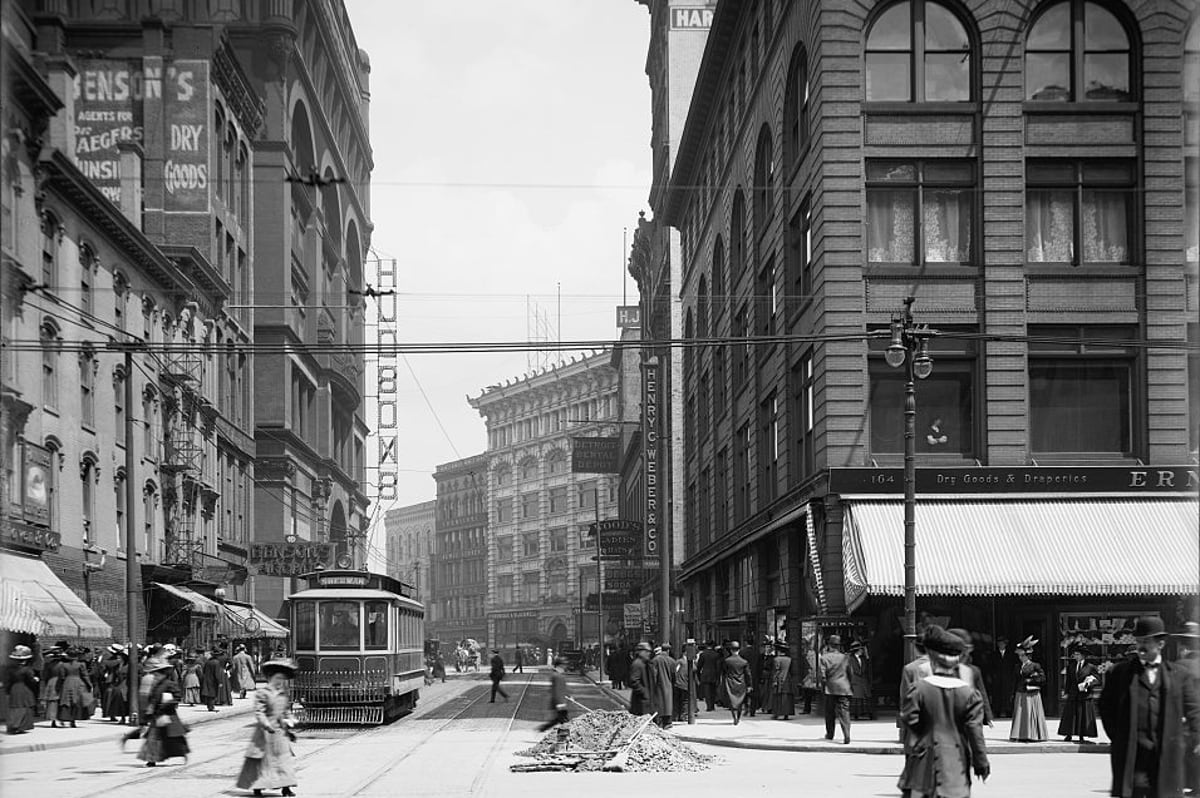
Hudson’s
It’s almost certain that Metro Detroiters have fond memories of shopping at Hudson’s (officially known as the J.L. Hudson Company) department store.
Founded in Detroit in 1881, Hudson’s was a downtown Detroit landmark with its flagship store on Woodward Avenue. The location was once the tallest department store building in the world and one of the biggest department stores in the United States.
For many families, a trip to a department store like Hudson’s was a big deal, offering customers a chance to shop for mid-to-high-end goods, including clothing, home goods, furniture, and electronics.
Demographic changes in the 1960s and 70s eroded sales and the flagship store closed in 1983 during a period of decline for Detroit. Hudson’s locations were acquired by Dayton-Hudson Corporation and many locations were rebranded as Marshall Field’s and later Macys.

Jacobson’s
While Hudson’s enjoyed retail popularity in Metro Detroit once upon a time, Jacobson’s was the place to go for Michiganders living in Jackson, Ann Arbor, Battle Creek, and other Michigan locales.
First opened by Abram Jacobson in Reed City in 1838, Jacobson’s eventually moved its headquarters to Jackson and opened locations in bigger cities, expanding into Indiana, Ohio, Kentucky, and Kansas as well.
Though the store catered to a varied clientele by offering apparel, jewelry, and home furnishings, the company encountered retail decline in the 1990s as well as increased competition.
By 2002, all Jacobson’s stores were closed after the company filed for bankruptcy. The brand was briefly re-established in Florida in 2004 with a single store, but that eventually closed in 2011.
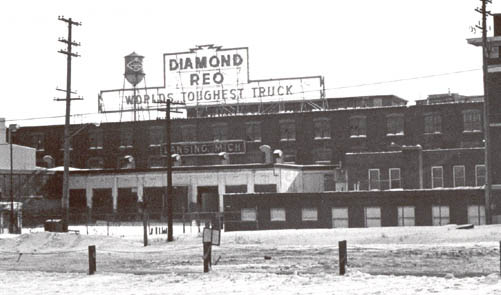
REO Motor Company
Founded in Lansing by famed entrepreneur Ransom E. Olds in 1905, the REO Motor Company manufactured trucks, autos, and some passenger buses from 1905 to 1975.
The company, named in part after Olds’ initials, is best known for the production of several memorable vehicles during its existence, including The Flying Cloud, the Reo Royale, and the REO Speed Wagon.
The Flying Cloud was introduced in 1927. It changed the way vehicles were named in the future as its name suggested a powerful combination of lightness and speed. The Reo Royale is remembered for its design, which predated streamlining in the US automotive market.
The Speed Wagon, which was produced from roughly 1915 to 1953, was a light motor truck designed in several configurations to serve in a variety of capacities. It’s perhaps best known as the namesake of the band REO Speedwagon.
The company ceased car production in the 1930s and focused on truck manufacturing, especially during World War II. By the 1950s, the company’s manufacturing operations were sold, and eventually, the company filed for bankruptcy in 1975.
Gone But Not Forgotten Companies in Michigan
From bookstores and department stores to grocers and restaurants, Michigan has had many well-known companies through the years. While the 12 companies/brands above no longer exist in Michigan, they haven’t been forgotten in the hearts and minds of many a Michigander.
